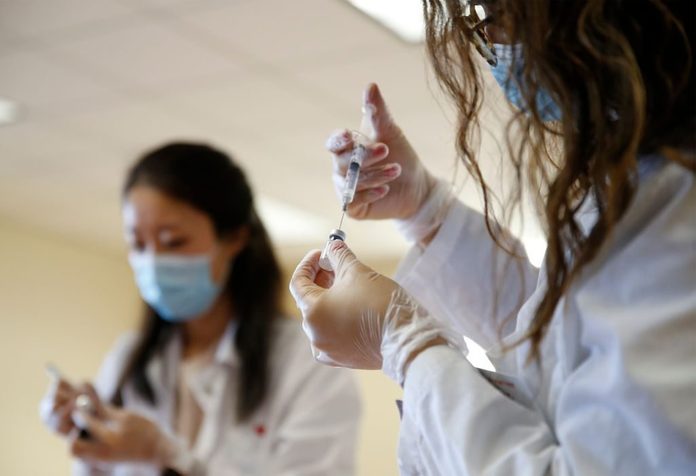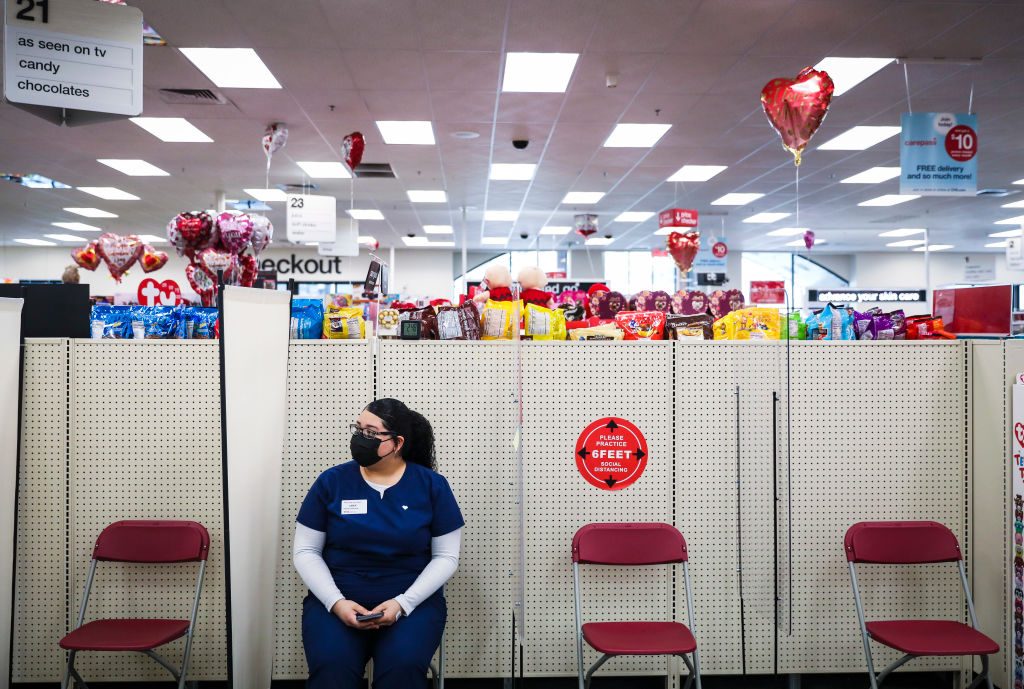How to Get the COVID-19 Vaccine at CVS
Updated: Nov. 02, 2022

The distribution of COVID-19 vaccines is ramping up. Look for shots at local retailers, including CVS pharmacies. Here's how to get yours.
Getting the COVID-19 vaccine at CVS
More and more doses of COVID-19 vaccines are becoming available, which means that members of the general public should be able to get their shots in the not-too-distant future.
Right now, shots are being administered at hospitals and long-term care facilities. But the U.S. Department of Health and Human Services has contracted with multiple retailers across the country and in Puerto Rico and the U.S. Virgin Islands to get the vaccine out to the general public. CVS, already involved with vaccinating high-priority groups, is one of them. CVS has about 10,000 locations throughout the United States including 1,100 Minute Clinics in CVS stores and in Target locations.
Why is the vaccine important?
Simply put, a COVID-19 vaccine is the best hope the world has to end the pandemic and get back to normal, or at least a new normal. If enough people gain immunity through vaccination, the virus won’t have anywhere to go and will die down if not die out. This is called herd immunity and protects not only people who have gotten the shot but those who haven’t.
No one knows exactly how many people need to be vaccinated to achieve herd immunity. But experts are estimating the number to be around 60 percent to 80 percent, says Katherine L. Baumgarten, MD, medical director of infection control and prevention at Ochsner Health in New Orleans.
Are the vaccines effective?
The Food and Drug Administration (FDA) has granted emergency use authorization to two vaccines, one developed by Moderna and the other by Pfizer with BioNTech. Both are about 95 percent effective after two doses, which is much higher than anyone had expected or predicted. And just recently in late February 2021, the FDA also granted emergency authorization to a one-dose shot from Johnson & Johnson as well.
So does it matter which one you get, speaking primarily about the Moderna and Pfizer vaccines? Not really. “As far as we can tell, the two vaccines are really equivalent,” says H. Dirk Sostman, MD, president of the Houston Methodist Academic Institute. “That’s not to say that you can get the first dose with one and the second with the other,” he says. Based on current science, you should end with the same vaccine you began with.
Will the vaccines protect against new mutations?
Two new variants of SARS-CoV-2 have recently been identified, one in the U.K. and one in South Africa, and both of them seem to be more contagious than the original virus. Scientists are still figuring out whether the vaccines will cover them but there has been some recent good news: A preliminary study, published January 7, 2021, in bioRxiv, suggests that the Pfizer vaccine can stop SARS-CoV-2 from infecting cells and replicating. More studies should be on the way.
Who should and should not get a vaccine
The Pfizer vaccine is approved for people 16 years and over while the Moderna vaccine is for those 18 and over. Studies are underway to see if the vaccines are also suitable for children. Other than people younger than the approved age, the only people who shouldn’t get the vaccine at this time are those who have had an allergic reaction to the first dose or to any of the ingredients in the vaccine, says Dr. Baumgarten.
As for who should get the vaccine, authorities are prioritizing people who are at a higher risk of getting severe disease, being hospitalized, or even dying of COVID-19. They’re at the top of the list to get vaccinated. “No age group is free of risk but the older you are, the greater the risk,” says William Schaffner, MD, an infectious diseases specialist at Vanderbilt University Medical Center in Nashville. The same goes “if you have a chronic underlying illness such as heart disease, lung disease, diabetes, or high blood pressure.”
Are the vaccines safe?
There’s no evidence so far that the vaccines can cause long-term or permanent damage, says Dr. Sostman. All the people who had anaphylactic or allergic reactions to one or the other of the vaccines have recovered. It’s true that the COVID-19 vaccine may be causing more allergic reactions than the flu vaccine, says Dr. Schaffner. But the numbers are still low, with the Centers for Disease Control and Prevention reporting about 11.1 per million doses.
There can be temporary side effects from the vaccine, including headaches, achiness, a slight fever, and chills, all of which go away and can be treated with an over-the-counter pain reliever. “Those can be more expected with the second dose of vaccine and in people a little younger,” says Dr. Baumgarten.
Health officials and organizations, including the FDA, are keeping a close eye in case any other reactions turn up.
What is the vaccine process?
The process varies by state but, generally, priority is being given to healthcare workers, residents and staff of long-term care facilities, folks over 75, and frontline workers. The rest of the population comes next and the cost is covered either by your health insurance provider or the government.
Both the Moderna and Pfizer vaccines require two shots, either 21 days (Pfizer) or 28 days (Moderna) apart. Vaccine administrators are monitoring people who have a history of allergic reactions to medications or vaccines in the past for 30 minutes after the shot. “We’re vaccinating people who have had a severe allergic reaction to any other medication with caution,” says Dr. Schaffner. These people should bring their EpiPens with them when they get the vaccine, he adds.

How do I get a COVID-19 vaccine at CVS?
CVS will be administering COVID-19 vaccines much as they offer the flu shot every year. The chain is already involved in vaccinating high-priority groups and says it’s preparing to have the vaccines available to the general public in early 2021. Bear in mind that this could be delayed by distribution problems.
Once the vaccinations are up and running, CVS hopes to give as many as 20 million to 25 million each month.
If you plan to get your COVID-19 vaccine at CVS, you’ll have to have an appointment either through the CVS app or online. You’ll schedule the first shot and a booster at the same time. Once you’ve been jabbed, you’ll be presented with an official vaccine card. While you may be proud of getting vaccinated and want to share a photo of your vaccine card, it’s actually not a wise idea.
There are other places you will be able to get the COVID-19 vaccine as well. Here’s how to get the COVID-19 vaccine at Costco and how to get the COVID-19 vaccine at Walmart.
Sources:
- Department of Health and Human Services: “Trump Administration Partners with Chain and Independent Community Pharmacies to Increase Access to Future COVID-19 Vaccines”
- CVS Health: “COVID-19: Vaccine information”
- Katherine L. Baumgarten, MD, medical director, infection control and prevention, Ochsner Health, New Orleans
- Food and Drug Administration: “Briefing Document Moderna COVID-19 Vaccine”
- New England Journal of Medicine: “Safety and Efficacy of the BNT162b2 mRNA Covid-19 Vaccine”
- H. Dirk Sostman, MD, president, Houston Methodist Academic Institute
- BBC: “South Africa coronavirus variant: What is the risk?”
- bioRxiv: “Neutralization of N501Y mutant SARS-CoV-2 by BNT162b2 vaccine-elicited sera”
- William Schaffner, MD, infectious diseases specialist, Vanderbilt University Medical Center, Nashville
- Morbidity and Mortality Weekly Report: “Allergic Reactions Including Anaphylaxis After Receipt of the First Dose of Pfizer-BioNTech COVID-19 Vaccine — United States, December 14–23, 2020”
- Commonwealth Fund: “The COVID-19 Vaccine Is Coming, but Will It Be Paid For? Federal and State Policies to Fill Gaps in Insurance Coverage”
- CVS Health: “CVS Mobile App”
- CVS Health: “Before we schedule your vaccine(s)”
- CVS Health: “The COVID-19 vaccine will be available in stores soon”
- Johnson & Johnson: “Johnson & Johnson COVID-19 Vaccine Authorized by U.S. FDA For Emergency Use – First Single-Shot Vaccine in Fight Against Global Pandemic”
